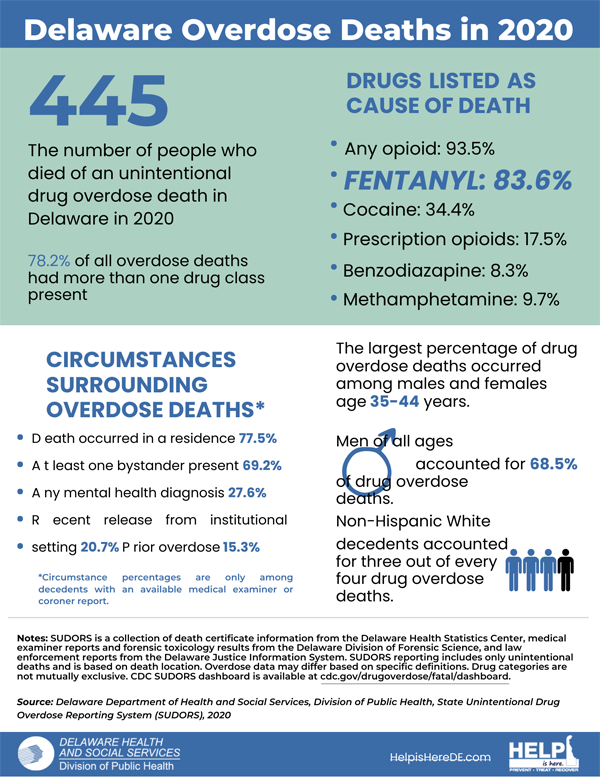Current Suspected Overdose Deaths in Delaware for 2025: Get Help Now!
Find school water testing results and additional resources
Attention Medicaid Participants: Eligibility Renewals Restarted April 1, 2023
Molly Magarik, Secretary
Jill Fredel, Director of Communications
302-255-9047, Cell 302-357-7498
Email: Jill.Fredel@delaware.gov
DPH Media Contact:
Tim Turane
Email: DPHMedia@Delaware.gov
Date: August 30, 2022
DHSS-8-2022
DOVER, DE (August 30, 2022) - The Division of Public Health (DPH) is releasing a 2020 State Unintentional Drug Overdose Reporting System (SUDORS) fact sheet on all drug overdose deaths that occurred in Delaware. This snapshot contains fatality data abstracted from the state's Overdose Data to Action (OD2A) collaborative. DPH collects and analyzes unintentional drug overdose death data from death certificate information, medical examiner reports, forensic toxicology results, and law enforcement reports.
The fact sheet provides information on the drugs listed as the cause of death on the death certificate and drugs identified as present by toxicology or medical examiner reporting. Almost all heroin overdose deaths had fentanyl present (99%). Furthermore, fentanyl was the drug most frequently listed as the cause of death (84%). Most overdose deaths had more than one drug present (78%) and (84%) of all cocaine overdose deaths had fentanyl. Similarly, fentanyl presence is high among methamphetamine (79%) and benzodiazepine (79%) overdose deaths.
"As we commemorate International Overdose Awareness Day on August 31 and remember the lives lost to overdose, it is important for all Delawareans and visitors to the state to know that no illicit drug is safe," said DPH Interim Director Dr. Rick Hong. "Assume that drugs not prescribed by your doctor contain, or are laced with, fentanyl. The information analyzed by the Overdose Data to Action collaborative clearly shows that fentanyl is present in not only opioids, but also cocaine, and counterfeit prescription medications."
DPH is finalizing its strategy to distribute fentanyl test strips in bulk. Currently, the public can receive two test strips in any DPH Narcan kit, which are available through mail order and at points of distribution (POD) events listed on HelpisHereDE.com. To prevent overdose death, in addition to having Narcan on hand and utilizing fentanyl test strips, a person in active substance use should never use alone and go slow so that someone they trust can monitor them for any adverse side effects.
To prevent the spread of infectious diseases, DPH encourages persons with substance use disorder (SUD) to engage with Brandywine Counseling & Community Services for more information and syringe exchange services by visiting BrandywineCounseling.com or calling 302-656-2348.
DPH encourages those struggling with SUD to visit HelpIsHereDE.com to connect to treatment online, in person, or by phone.
Friends and family need to recognize the signs and symptoms of a SUD. It is also important that parents, educators, counselors, and other influential members recognize the seriousness of fentanyl and have conversations about the risk of overdose when experimenting with drugs.
If you or a loved one is struggling with addiction in Delaware, call the DHSS 24/7 Crisis Hotline to be connected to treatment and recovery options. In New Castle County, call 1-800-652-2929. Or in Kent and Sussex counties, call 1-800-345-6785.
For free 24/7 counseling, coaching, and support, as well as links to mental health, addiction, and crisis services call the Delaware Hope Line at 833-9-HOPEDE. To search for treatment and recovery services in Delaware or nearby states, visit HelpIsHereDE.com.
Anyone who is deaf, hard of hearing, Deaf-Blind or speech disabled can contact DPH by dialing 711 first using specialized devices (i.e. TTY, TeleBraille, voice devices). The 711 service is free and to learn more about how it works, please visit delawarerelay.com.
DPH, a division of DHSS, urges Delawareans to make healthier choices with the 5-2-1 Almost None campaign: eat 5 or more fruits and vegetables each day, have no more than 2 hours of recreational screen time each day (includes TV, computer, gaming), get 1 or more hours of physical activity each day, and drink almost no sugary beverages.

Delaware Health and Social Services is committed to improving the quality of the lives of Delaware's citizens by promoting health and well-being, fostering self-sufficiency, and protecting vulnerable populations.